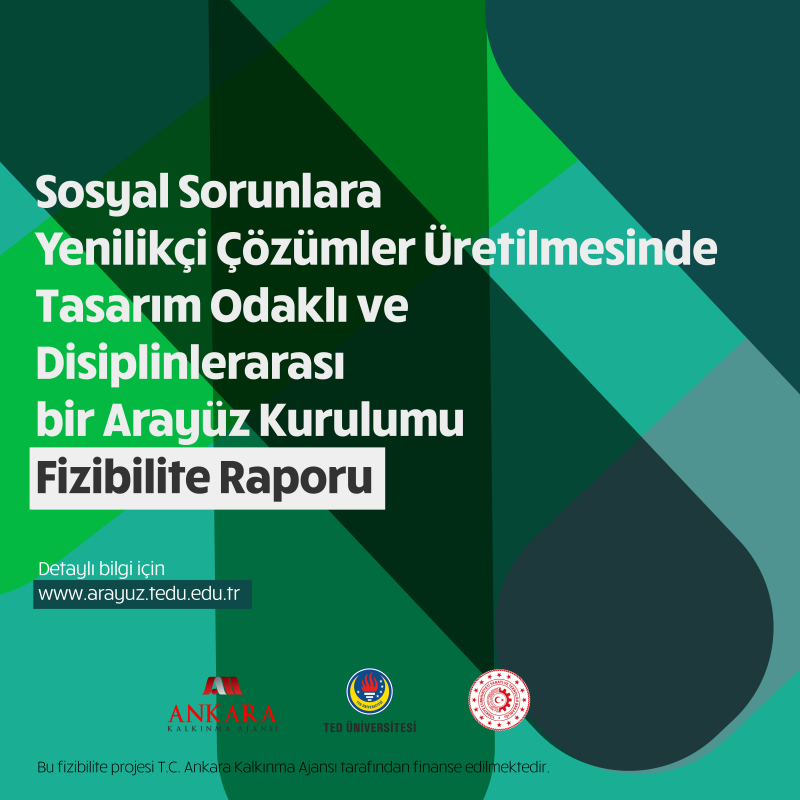
TED UNIVERSITY is looking for innovative solutions to the complex and multi-layered social problems of our time. As a result of the feasibility study that has been carried out for a year, an INTERFACE was designed, based on participatory, interdisciplinary and design-thinking approaches, that brings experts, researchers and young people together from different fields and sectors such as education, scientific research, R&D, innovation, arts and culture.
The feasibility study was initiated by determining the current situation, then future designs were developed and awareness/visibility activities were carried out. During the study, literature review and weekly study meetings were conducted, good practices were visited in Ankara, Izmir and Istanbul, focus group meetings were organised, an international modelling workshop was carried out and live surveys were conducted.
The basic principles of the project were defined as transparency, impartiality, inclusiveness, and sustainability by the focus groups conducted with potential stakeholders. The need for a match-making center, acting as a structure that will make interventions at systems level is determined. For accessibility reasons, a place near but outside TED University’s campus was deemed appropriate. As a result of the modelling workshop, the approach of the interface about governance, program development, service design, business model and financial sustainability, collaboration models, network-community building, social impact management and assessment were clarified. Besides collecting data about the ecosystem and expectations/needs/demands of the ecosystem, with all these studies a ground is prepared for the future cooperation, creating ownership and developing a common understanding, which will also contribute to the implementation of the feasibility.
The motivation of the project is the university’s belief in the necessity of contributing to the solutions of the increasing and complicating new socio-economic problems. The solution proposal put forward with this motivation is “interdisciplinarity based on design thinking”. The demand for the structures having similar functions with the interface is constantly increasing in our country and in the world. Ankara is a prominent city in Turkey in creative economy and industries. In this context, the share of the service sector in terms of sectoral distribution and employment in Ankara is high; its position in creative economy and industries is important and its strong potential of research and development and innovation activities support the rationale of the project.
In the feasibility report, detailed information about Ankara and especially the periphery of the TED University, where the interface project is planned to be implemented, was shared. In addition to Ankara's high qualified population in terms of intellectual capacity and cultural capital, the following qualities came to the fore in the choice of location for the interface: high physical accessibility in the urban area; flexibility of the physical places, proximity to fiber internet infrastructure.
The organizational structure and governance model of the interface will be based on flexibility, participation, transparency, equality and horizontal organization. In this context, an operational core team will be defined at the interface. In addition to the core team, the interface will also benefit from the qualified human resources working in the co-working space. Therefore, the organizational structure without a hierarchical order will have a transitional and flexible design in which the core team and the community of the co-working space work together and also feed from the external stakeholders.
In the feasibility report, the revenue and cost items for both the investment and the operating processes, estimated amounts, and financing plan predictions were shared for two alternative cases. The alternatives were built on the criteria of the size of the space, the general income model to be used, and the main source of the initial investment.
Finally, financial, economic, social and regional analyses were shared in the light of these findings regarding the implementation of the interface. The sensitivity of the model was examined, the risks were identified and the measures to be taken to prevent these risks were proposed. Reports on the studies conducted within the scope of feasibility are presented in the annexes of the report.
You can access to the Feasibility Report (currently only in Turkish), here.